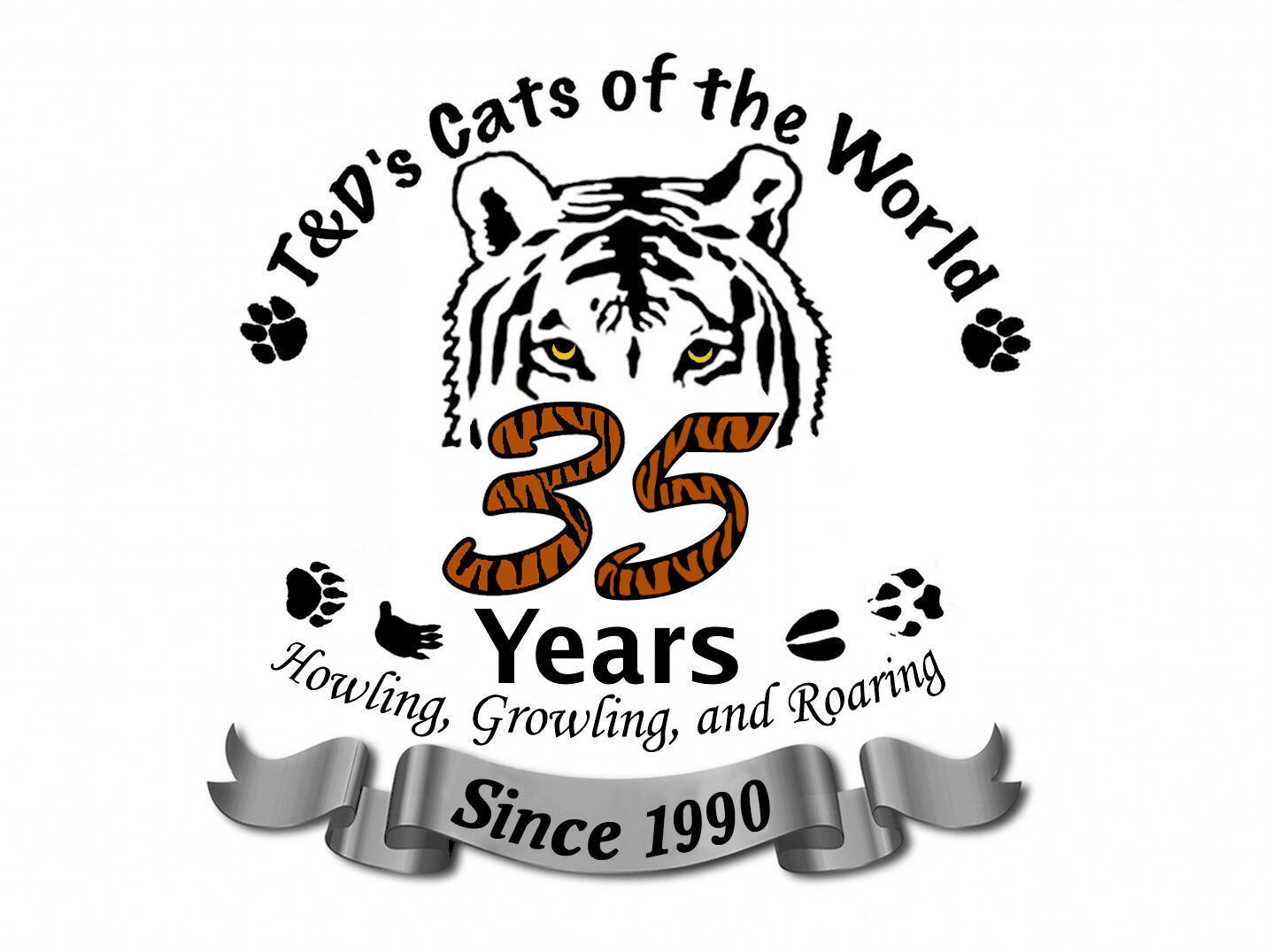
Mission Statement
T&D’s is dedicated to providing a permanent safe haven for unwanted, abused and mistreated exotic pets and wild animals. T&D’s will accept as many of these animals as current space allows.
T&D’s will not sell, give or trade exotic animals. T&D’s does not condone breeding exotic or wild animals for the pet trade, private ownership or other exploitation.
T&D’s will strive to provide the best care to include diet, housing, behavioral and mental stimulation plus veterinarian care for the animals.
T&D’s will continue to educate the public about the animals and why such facilities exist through educational handouts, exhibits and tours of our facility.
T&D’s owners will continue their animal care knowledge through attending seminars, conferences and symposiums presented by universities, accredited zoos, government agencies and other reputable organizations.
T&D’s will assist local, state and federal agencies in any way possible in the interest of the welfare of other animals.
There are many species which call T&D’s home. When you visit you may see the following (listed by common names):
Bears
- American Black Bear
- Himalayan Black Bear
Birds
- Bald Eagle
- Indian Peacock
- Emu
- Eurasion Eagle Owl
Canines
- Dingo
- Eastern Coyote
- Red fox
- Wolf
Felines
- African lion
- Bengal tiger
- Bobcat
- Cougar (Mountain lion, Puma, Panther-same animal)
- Serval
- Siberian tiger
Primates
- Black handed spider monkey
- Brown lemur
- Capuchin
- Japanese snow macaque
- Pigtailed macaque
- Rhesus macaque
- Ring tailed lemur
- Squirrel monkey
- Tonkean macaque
- Vervet monkey
- White bellied spider monkey
Raccoon
- Brown nose coati
- Raccoon
- Kinkajou
Others
- Binutrong
- Fallow deer
- Fisher
- Kangaroo
- North American river otter
- Patagonian cavy
- Wallaby
- White tailed deer

FAQ
WHERE DO THE ANIMALS COME FROM?
Private individuals, government agencies, zoos, and other refuge organizations. Once an animal comes to live at T&D’s, it has a home at T&D’s for life. T&D’s opened for the public in 1990.
HOW DO PRIVATE INDIVIDUALS GET THESE ANIMALS?
Each state has different laws regarding private ownership of exotic animals. Most states are now requiring people to have experience/education with the species before issuing the person a permit. Still, in some states anyone can own these animals without the proper training. There are exotic animal auctions and breeders that will sell these animals. PA now requires experience before anyone is allowed to own an exotic animal.
WHAT PERMITS DOES T&D’S HAVE?
State and federal licenses are required to house and exhibit the animals. Permits need to be renewed each year and government officials inspect our facility several times a year.
WHAT DO THE CATS EAT?
12,000 pounds of meat each and every month! This is like eating 10-12 cows every month! Farmers donate cows, calves, or horses that have died from natural deaths. Road-killed deer are donated by the PA Game Commission. However, even with this help, chicken is also purchased for the animals. The carcass diet is more natural, nutritional, and provides enrichment for the animals. No animals are fed alive.
HOW IS T&D’S FUNDED?
Local, state, or federal governments do NOT fund the animals. T&D’s is NOT funded by any business or organization. The owners use their pension and retirement monies to care for the animals. Donations are less than $400.00 per month. Admission fees help, but do not provide enough funding. You can help by making a donation, Sponsoring An Animal, donating materials (see wish list), volunteering your time or services, etc.
ARE THE ANIMALS TAME/DO YOU PLAY WITH THEM?
Wild animals will never be tame. A better word is “imprinted”. An imprinted animal is not afraid of humans and may rely on humans for food/water/care, but they are still wild animals; you can never trust them. T&D’s owners can carefully touch the large cats through the fence. They do NOT go into the pens with the cougars, tigers, lions, leopards or bears. These animals could kill someone just in playing. The animals do not realize their strength. Some of the animals were declawed and/or teeth have been removed prior to arriving at T&D’s. We do not recommend such practices, it is very painful for the animal. They are still wild animals and still have the same strength (even if they don’t have teeth or claws).
VETERINARIAN CARE?
Veterinarians need special training to care for exotic animals. Our veterinarians are in State College, Watsontown, and Selinsgrove. T&D’s owners and veterinarians also consult with other zoo veterinarians.
